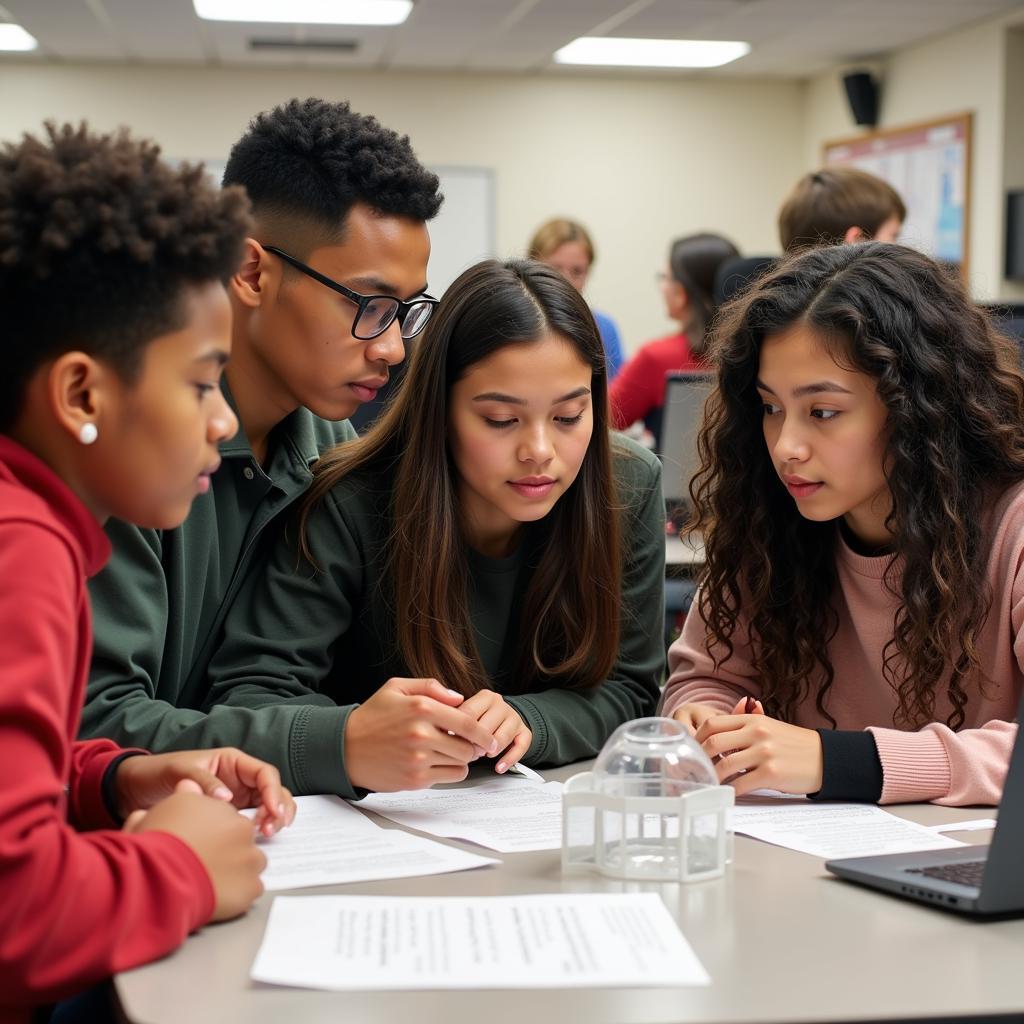Describing a friend you made in school is a common topic in IELTS Speaking tests. This theme allows examiners to assess your ability to discuss personal relationships, memories, and experiences. Given its relevance to everyday life, it’s likely to appear in future IELTS exams. Let’s explore how to tackle this topic effectively across all parts of the IELTS Speaking test.
Part 1: Introduction and Interview
In this section, the examiner may ask general questions about friendships and school experiences. Here are some potential questions and sample answers:
Q: Do you still keep in touch with your school friends?
Band 6-7 Answer:
Yes, I do. I regularly communicate with a few close friends from school through social media and occasional meetups.
Band 8-9 Answer:
Absolutely. I maintain strong connections with several friends from my school days. We not only stay in touch through various digital platforms but also make a concerted effort to organize regular reunions and catch-ups in person.
Q: What qualities do you think are important in a school friend?
Band 6-7 Answer:
I believe trustworthiness and shared interests are crucial for school friendships. It’s important to have someone you can rely on and enjoy spending time with.
Band 8-9 Answer:
In my opinion, the cornerstones of a strong school friendship are unwavering loyalty, mutual respect, and compatible personalities. These qualities foster a supportive environment where both individuals can thrive academically and grow personally.
 School friends laughing together
School friends laughing together
Part 2: Long Turn
Here’s a sample cue card for this topic:
Describe a friend you made in school
You should say:
- Who this person is
- How you met them
- What you like about them
- And explain why this friendship is important to youBand 6-7 Answer:
I’d like to talk about my friend Sarah, whom I met in high school. We first crossed paths in our biology class when we were paired up for a lab experiment. What I appreciate most about Sarah is her sense of humor and her ability to listen. She always knows how to make me laugh, even when I’m feeling down, and she’s a great listener when I need to talk about something serious.
This friendship is important to me because Sarah has been a constant support throughout our school years and beyond. We’ve shared many experiences, both good and challenging, which has strengthened our bond. Her presence in my life has made school more enjoyable and has helped me grow as a person.
Band 8-9 Answer:
I’d like to delve into my friendship with Alex, a remarkable individual I encountered during my formative years in secondary school. Our initial interaction occurred rather serendipitously in the school library, where we both reached for the same book on astrophysics, sparking an immediate connection over our shared passion for science.
What stands out about Alex is his insatiable curiosity and unwavering determination. He possesses an extraordinary ability to approach complex problems with both creativity and analytical rigor, which never fails to inspire and challenge me intellectually. Moreover, his empathetic nature and genuine interest in others’ well-being make him an exceptional confidant and support system.
This friendship holds immense significance in my life for several reasons. Firstly, it has been a catalyst for personal growth, consistently pushing me to expand my horizons and strive for excellence. Secondly, our shared journey through academic challenges and personal milestones has forged an unbreakable bond that I deeply cherish. Lastly, Alex’s unwavering support and belief in my potential have been instrumental in boosting my confidence and helping me overcome obstacles, both in and out of school.
Follow-up questions:
- How has this friendship evolved since you left school?
Band 6-7 Answer:
Our friendship has grown stronger over time. We’ve supported each other through university and our early careers, and we still make time to catch up regularly despite our busy schedules.
Band 8-9 Answer:
Our friendship has undergone a remarkable transformation since our school days. We’ve weathered the challenges of geographical distance and diverging life paths, yet our bond has only deepened and matured. We’ve become each other’s confidants and career advisors, offering invaluable perspectives as we navigate the complexities of adult life.
- In what ways do you think school friendships differ from those made later in life?
Band 6-7 Answer:
School friendships are often more carefree and based on shared experiences during our formative years. Friendships made later in life might be more focused on common career interests or life stages.
Band 8-9 Answer:
School friendships possess a unique quality of innocence and intensity that’s hard to replicate later in life. They’re forged in the crucible of shared formative experiences, from academic pressures to personal growth milestones. In contrast, adult friendships tend to be more nuanced and pragmatic, often revolving around mutual interests or professional networks. However, the depth and authenticity of school friendships often serve as a benchmark for all future relationships.
 Friends studying together in library
Friends studying together in library
Part 3: Two-way Discussion
In this section, the examiner will ask more abstract questions related to friendships and education. Here are some potential questions and sample answers:
Q: How do you think technology has impacted friendships among young people today?
Band 6-7 Answer:
Technology has made it easier for young people to stay connected with friends through social media and messaging apps. However, it might also reduce face-to-face interactions, which are important for building strong relationships.
Band 8-9 Answer:
Technology has profoundly reshaped the landscape of youth friendships. On one hand, it has facilitated unprecedented connectivity, allowing young people to maintain and nurture relationships across vast distances and cultural boundaries. Social media platforms and instant messaging have created a sense of constant presence in friends’ lives.
However, this digital interconnectedness is a double-edged sword. While it broadens social circles, it can also lead to superficial interactions and a false sense of intimacy. The overreliance on digital communication may impede the development of crucial interpersonal skills, such as reading non-verbal cues and engaging in deep, meaningful conversations.
Moreover, the pressure to present an idealized online persona can strain authentic connections. Young people may find themselves comparing their lives to the carefully curated images of their peers, potentially fostering feelings of inadequacy or social anxiety.
Ultimately, while technology offers powerful tools for connection, it’s essential for young people to strike a balance between online and offline interactions to cultivate robust, multifaceted friendships.
Q: Do you believe the education system does enough to foster meaningful friendships among students?
Band 6-7 Answer:
I think schools provide opportunities for students to make friends through group projects and extracurricular activities. However, there could be more emphasis on teaching social skills and creating environments that encourage deeper connections.
Band 8-9 Answer:
The role of the education system in nurturing meaningful friendships is a complex and nuanced issue. While schools inherently provide a fertile ground for social interactions, I believe there’s room for improvement in deliberately fostering deep, lasting connections among students.
On the positive side, many educational institutions recognize the importance of social development alongside academic growth. They implement collaborative learning strategies, organize team-building activities, and offer a diverse array of extracurricular programs that naturally facilitate friendship formation.
However, the intense focus on academic achievement in many education systems can inadvertently overshadow the importance of social bonds. The pressure to perform in standardized tests and maintain high grades can create a competitive atmosphere that may hinder genuine connections.
To address this, schools could integrate social-emotional learning more comprehensively into their curricula. This might include dedicated time for relationship-building activities, mentorship programs, and explicit teaching of interpersonal skills such as empathy, active listening, and conflict resolution.
Moreover, education systems could place greater emphasis on creating inclusive environments that celebrate diversity and encourage students to form friendships across social and cultural boundaries. This approach would not only enrich students’ social experiences but also prepare them for the increasingly interconnected global society they’ll navigate in adulthood.
 Diverse student group collaborating on project
Diverse student group collaborating on project
Key Vocabulary and Phrases for High Scores
-
Formative years (noun phrase) /ˈfɔːmətɪv jɪəz/: The period in someone’s life that has an important influence on the way they develop.
Example: Our friendship began during our formative years in high school. -
To forge a bond (verb phrase) /fɔːdʒ ə bɒnd/: To create a strong relationship or connection.
Example: We forged a strong bond through our shared experiences in the debate club. -
Unwavering support (noun phrase) /ʌnˈweɪvərɪŋ səˈpɔːt/: Continuous and steady assistance or encouragement.
Example: Her unwavering support helped me through the toughest times in school. -
To weather challenges (verb phrase) /ˈweðə ˈtʃælɪndʒɪz/: To successfully deal with or overcome difficulties.
Example: Our friendship has weathered many challenges over the years. -
Catalyst for growth (noun phrase) /ˈkætəlɪst fɔː grəʊθ/: Something that causes or accelerates development or improvement.
Example: My friendship with Alex has been a catalyst for personal growth.
Examiner’s Advice
To achieve a high score in the IELTS Speaking test when discussing friends from school:
-
Use a range of vocabulary: Incorporate sophisticated words and phrases related to friendships and personal development.
-
Provide specific examples: When describing your friend or experiences, offer concrete details to make your answer more engaging and authentic.
-
Show reflection: Demonstrate your ability to analyze the impact of the friendship on your life and personal growth.
-
Maintain fluency: Practice speaking on this topic to ensure you can discuss it smoothly and confidently.
-
Develop your ideas: In Part 3, aim to provide thoughtful, well-developed responses that showcase your ability to discuss abstract concepts related to friendships and education.
Remember, the key to success in the IELTS Speaking test is to communicate effectively while demonstrating a wide range of language skills. Practice regularly with these tips in mind to improve your performance.
If you found this guide helpful, you might also be interested in learning how to describe a recent event that brought your community together or describe a historical site you visited. These topics can help you further expand your vocabulary and speaking skills for the IELTS test.


